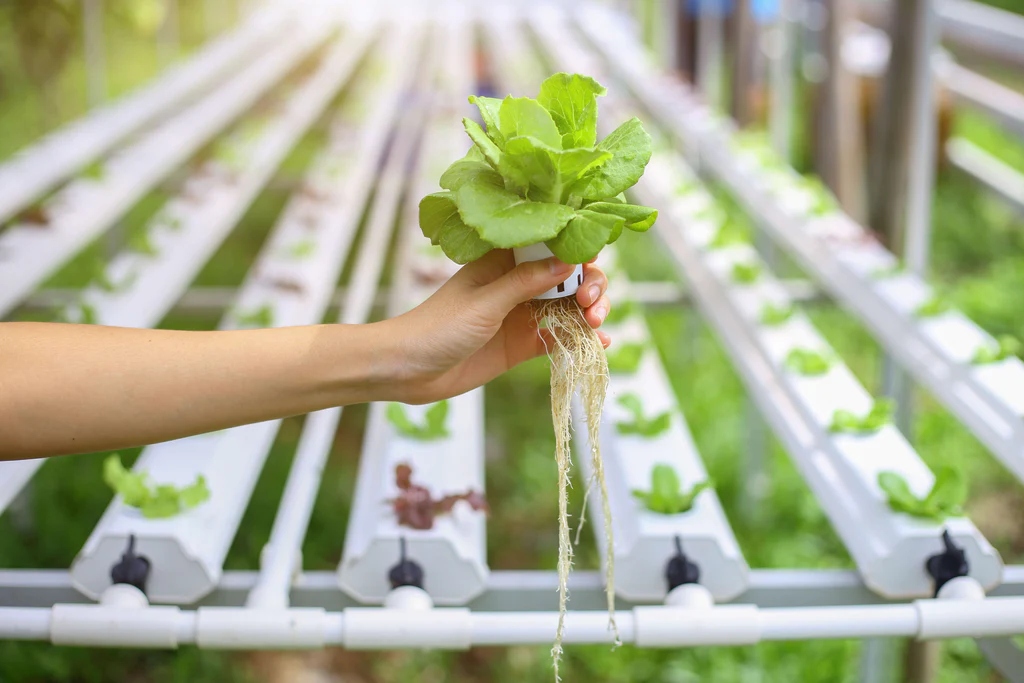Hydroponic garden has gained significant attention in recent years as a revolutionary and sustainable method of growing plants without the need for soil. This innovative approach to agriculture utilizes nutrient-rich water solutions to deliver essential minerals directly to plant roots, providing an efficient and controlled environment for optimal growth. In this article, we will delve into the fascinating world of hydroponic gardening, exploring its principles, benefits, and different systems.
What is a hydroponic garden system?
In a world that is changing swiftly and has limited resources, hydroponic gardening offers a means to grow fresh, nutrient-rich food that is free of pesticides.
The Greek word for water is “hydro,” while the word for labor is “ponos.” When growing plants hydroponically, water does the heavy lifting, carrying nutrients to the roots of the plants.
Plants require water, sunshine, carbon dioxide (often from air circulation), and nutrients to flourish. Plant roots in a conventional garden must search the soil for nutrition. Plants in hydroponic gardens have even easier access to the necessary nutrients. This is because the nutrients are dissolved in the water surrounding the roots. What was the outcome? Plants usually grow large and showy very rapidly.
At the core of hydroponic gardening is that plants do not necessarily need soil to thrive; they need essential nutrients, water, and light. Hydroponics leverages this understanding by creating a soil-less environment where plants receive nutrients directly through a water-based solution. This nutrient solution contains a balanced blend of minerals, ensuring that plants receive precisely what they need for robust growth.
According to USDA:
Growing plants in water culture or sand culture without soil are procedures that have been used by physiologists studying plant nutrition and by other plant scientists for more than a century.
USDA
Hydroponic Garden Systems
Nutrient Film Technique (NFT) System
The Nutrient Film Technique (NFT) is a hydroponic system that propels plant cultivation into the future. In this system, a thin film of nutrient-rich water flows over the plant roots, providing a continuous supply of essential minerals. This method ensures that the roots receive optimal nutrition without the need for soil.
The roots are suspended in a trough or channel, allowing for efficient nutrient absorption. One of the key advantages of NFT is its closed-loop design. This is where excess nutrient solution is collected and recirculated.
Deep Water Culture (DWC) System
Deep Water Culture (DWC) is a straightforward yet highly effective hydroponic system. In DWC, plant roots are suspended in a nutrient solution, and an air stone is used to provide oxygen directly to the roots.
This combination of nutrient-rich water and oxygen creates an ideal environment for plant growth. DWC is known for its simplicity and cost-effectiveness. This makes it an excellent choice for beginners or those looking for an uncomplicated yet efficient hydroponic system. It is particularly best for growing plants like lettuce and herbs.
Drip System
The Drip System is a versatile hydroponic setup that caters to a wide range of plants. In this system, the nutrient solution is periodically dripped onto the base of each plant. This controlled delivery of nutrients allows for precise and efficient nourishment.
The flexibility of the Drip System makes it adaptable to different plant types and growth stages, making it a popular choice among hydroponic enthusiasts. Its ease of use and ability to scale up for larger setups contribute to its widespread adoption.
Aeroponics System
Aeroponics represents the pinnacle of innovation in hydroponic systems. In an Aeroponics system, plants are suspended in air, and nutrient solution is delivered as a fine mist. This method ensures maximum oxygen availability to the roots, promoting faster growth and heightened nutrient absorption.
Aeroponics are very efficient and able to produce superior yields in a compact space. While it requires careful monitoring and management, the benefits in terms of accelerated plant growth make it a compelling choice for advanced hydroponic practitioners.
Benefits of Hydroponic Gardening
Water Efficiency
Hydroponic gardening stands out for its remarkable water efficiency. Unlike traditional soil-based agriculture, hydroponic systems recirculate water within a closed loop. This minimizes water wastage and ensures that plants receive a consistent and controlled supply of moisture, contributing to sustainable water use.
Faster Growth Rates
Plants grown hydroponically often exhibit faster growth rates compared to their soil-based counterparts. The direct delivery of nutrients to the roots eliminates the need for plants to expend energy searching for nutrients in the soil. This accelerated growth is particularly advantageous for crops with short growing seasons, allowing for more frequent harvests and increased overall productivity.
Space Optimization
Hydroponic systems can be designed to optimize space, making them suitable for environments with limited land availability. Vertical hydroponic setups, in particular, capitalize on unused vertical space, allowing for the cultivation of a greater number of plants in a given area. This space-efficient design is a game-changer for urban agriculture and indoor gardening enthusiasts.
Year-Round Cultivation
One of the significant advantages of hydroponic gardening is its ability to enable year-round cultivation. Hydroponic systems provide a controlled environment where temperature and light conditions can be manipulated. This flexibility extends the growing season, ensuring a continuous and reliable fresh produce supply.
Precise Nutrient Control
Hydroponic gardening affords growers precise control over the nutrient composition of the growing environment. By customizing the nutrient solution, growers can tailor the mix to suit the specific needs of different plants and growth stages. This precision ensures that plants receive optimal nutrition, leading to healthier and more robust growth, and ultimately maximizing yields.
FAQs
What plants can be grown in hydroponics?
Hydroponically grown crops include leaf lettuce, tomatoes, peppers, cucumbers, strawberries, watercress, celery, and some herbs. The way a crop is supported in the nutrient solution is important when designing a system for that crop.
What are the key advantages of hydroponic gardening over traditional soil-based methods?
Hydroponic gardening offers several advantages, including water efficiency, faster growth rates, space optimization, year-round cultivation, and precise control over nutrient levels. These benefits contribute to a more sustainable and efficient approach to plant cultivation.
How does hydroponic gardening contribute to water conservation?
Hydroponic systems are highly water-efficient due to the recirculation of water within the closed system. This contrasts with traditional soil-based agriculture, where water can be lost through runoff and evaporation. The controlled environment of hydroponics minimizes water wastage, making it a more sustainable option in regions facing water scarcity.
Can hydroponic gardening be implemented at home, and what is needed for a basic setup?
Yes, hydroponic gardening is possible at home. A basic setup typically requires a nutrient reservoir, a water pump, growing containers, a nutrient solution, and a suitable growing medium. Additionally, growers may use artificial lighting for indoor setups or take advantage of natural sunlight for outdoor systems. Home hydroponics allows individuals to enjoy fresh produce year-round, regardless of outdoor growing conditions.
Conclusion
The hydroponic garden represents a sustainable and efficient alternative to traditional soil-based cultivation. With its ability to conserve water, maximize space, and promote faster growth, this innovative approach has the potential to revolutionize the future of agriculture. As technology continues to advance, hydroponic systems are becoming more accessible to home gardeners and commercial growers alike, offering a glimpse into a greener and more sustainable future for food production.


